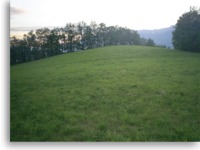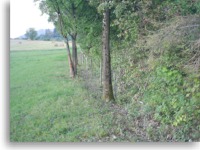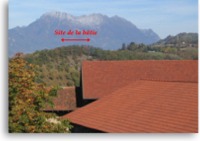| In the 14th century, the stony
castle was not the only way to assert its authority on a
territory. In Haut-Grésivaudan, lordship over a certain number
of border lands was disputed by Savoy and Dauphiné (they were
called “Marches”). A curious sort of fortification was invented
that was named ‘Batie” (or Fort).
The Fort is a type of light fortification, mostly made of
moats and ground levies overhung by wooden towers. Unlike a
stony castle, these fort were built relatively quickly,
typically in a month, and were intended to take ownership of a
disputed territory. Its objective is thus both defensive and
offensive and is very similar to the trenches of World War I.
This tactical warfare was mainly used in the Grésivaudan
valley (along with two other forts built along a creek in the
valley between Chapareillan and Les Marches in 1339, and in the
Bugey region (in the modern “department” of Ain), where two
opposite forts were facing each other above the city of
Ambérieux: The Savoyard fort of Luisandre and the Dauphinois
fort of Les Allymes .
This original and almost anachronistic trait incited us to
try to restore the aspect of the Fort of Mont Briton, built in
1313 and overlooking the Bréda creek canyon. in overhang of the
gorges(breasts) of Bréda. We used the financial accounts of the
castle of Montmélian, as well as researches made for the fort of
Gironville, near Ambérieux in Bugey.
|

The site seen from the North.
Behind the trees: Avalon.

The second moat can still be seen along the fence

The site of Mont-Briton, seen from the tower of Avalon |